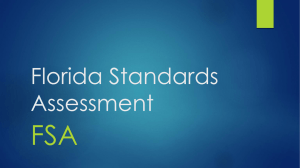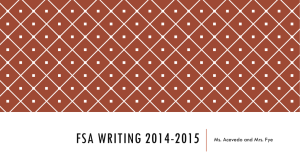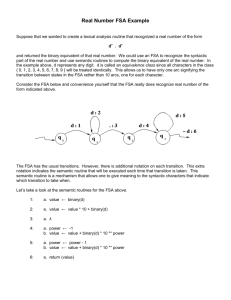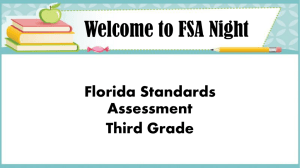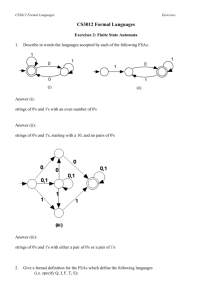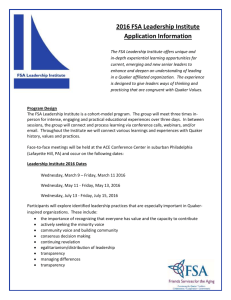(FSA) - Questions and Answers
advertisement
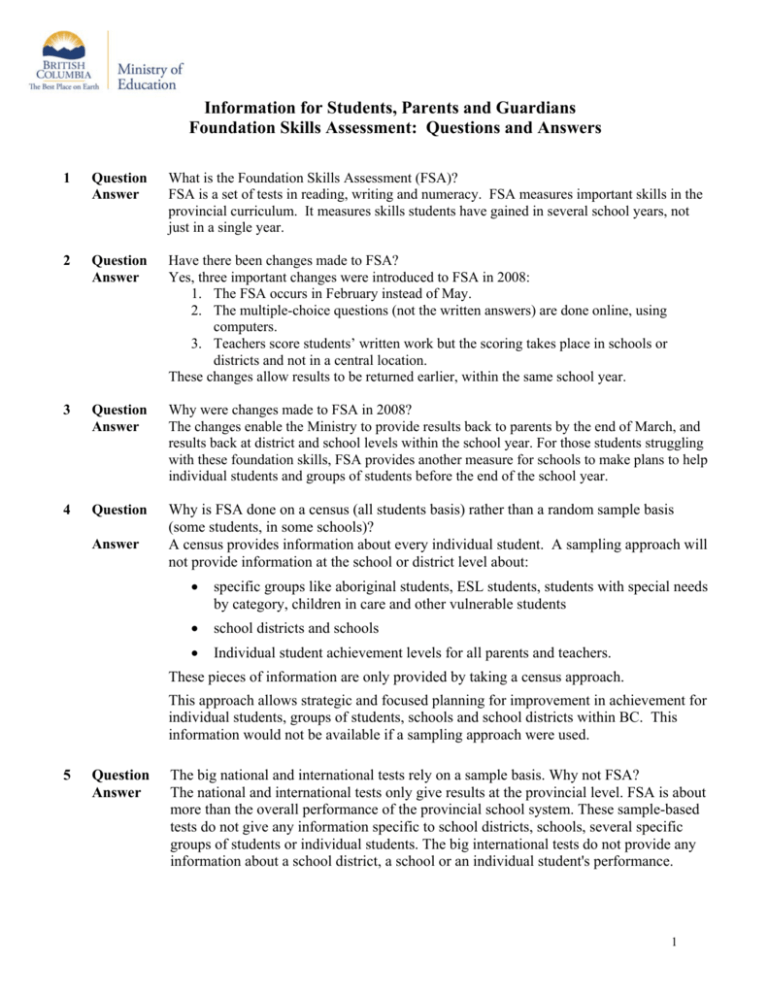
Information for Students, Parents and Guardians Foundation Skills Assessment: Questions and Answers 1 Question Answer What is the Foundation Skills Assessment (FSA)? FSA is a set of tests in reading, writing and numeracy. FSA measures important skills in the provincial curriculum. It measures skills students have gained in several school years, not just in a single year. 2 Question Answer Have there been changes made to FSA? Yes, three important changes were introduced to FSA in 2008: 1. The FSA occurs in February instead of May. 2. The multiple-choice questions (not the written answers) are done online, using computers. 3. Teachers score students’ written work but the scoring takes place in schools or districts and not in a central location. These changes allow results to be returned earlier, within the same school year. 3 Question Answer Why were changes made to FSA in 2008? The changes enable the Ministry to provide results back to parents by the end of March, and results back at district and school levels within the school year. For those students struggling with these foundation skills, FSA provides another measure for schools to make plans to help individual students and groups of students before the end of the school year. 4 Question Why is FSA done on a census (all students basis) rather than a random sample basis (some students, in some schools)? A census provides information about every individual student. A sampling approach will not provide information at the school or district level about: Answer • specific groups like aboriginal students, ESL students, students with special needs by category, children in care and other vulnerable students • school districts and schools • Individual student achievement levels for all parents and teachers. These pieces of information are only provided by taking a census approach. This approach allows strategic and focused planning for improvement in achievement for individual students, groups of students, schools and school districts within BC. This information would not be available if a sampling approach were used. 5 Question Answer The big national and international tests rely on a sample basis. Why not FSA? The national and international tests only give results at the provincial level. FSA is about more than the overall performance of the provincial school system. These sample-based tests do not give any information specific to school districts, schools, several specific groups of students or individual students. The big international tests do not provide any information about a school district, a school or an individual student's performance. 1 6 Question Answer How long does the FSA take? Approximately four and a half hours. Schools have four weeks during which to give FSA. Most schools spread FSA over at least three sessions so students have a chance to do their best. Students take FSA only in Grade 4 and 7 – so that is less than 10 hours of provincial testing from Kindergarten through Grade 9. 7 Question Answer 8 Question Answer Do students have to practice for FSA? Doesn’t this practice take away from classroom time? Students should be covering foundation skills of reading, writing and numeracy in their regular classroom activities. Teachers and students do not need to “skill and drill” for FSA. However, students will be able to do their best if they are comfortable with the FSA format (the type of questions, how to answer on the computer sections, and how long their answers should be on the written questions). Sample FSA questions are available at: www.bced.gov.bc.ca/assessment/fsa/ Why are BC students writing this test? The primary purpose of FSA is to help schools, school planning councils, school districts and the province evaluate how foundation skills are being addressed and make plans for improvement. The secondary purpose is to give parents, teachers and principals information about individual students. FSA provides a “snapshot” of how well BC students are doing on foundation skills. It helps answer important questions such as “Are students learning vital skills they will need later?” “Is student achievement improving over time?” “Are there any trends in student performance at the school, district or provincial levels?” and “How are specific groups of students doing?” FSA results can show students, parents and teachers where students are doing well and skills they need to work on. FSA results complement classroom work and report card information and usually there is a good match between these different types of information. When there are differences, parents should check with their child’s teacher. 9 Question Answer Is FSA expensive? FSA costs about $7.50 per test for each student in Grade 4 and 7. This includes such things as creating the tests, printing and shipping the answer booklets, providing money to school districts to train scorers and giving schools and districts added information about how groups of their students did on FSA questions. School districts may have some expenses to complete the local scoring. 10 Question Answer Who creates the FSA tests? BC teachers are contracted by the Ministry to develop the FSA tests. 11 Question Answer Who takes FSA? With very limited exceptions, the FSA is taken each year by all students in Grades 4 and 7 in BC public schools and publicly-funded independent schools. 12 Question Answer What type of test is FSA? The reading and numeracy tests consist of multiple-choice questions and written answers. The writing section has two writing tasks—one shorter and one longer. 2 13 Question Answer How is FSA scored? Scoring of the multiple-choice questions is automated. These are the biggest sections of the reading and numeracy tests. Each school district and each independent school takes care of scoring the written questions. Students get separate scores for reading, writing and numeracy. And remember that the written responses to the reading and numeracy are important but they represent only a small portion of the students’ final scores on these sections. There is no overall score for FSA. 14 Question If the written sections are scored locally, how do we know the scoring is fair, accurate and consistent? Training and scoring information are available on the Ministry website. During the scoring sessions, trained scorers follow Ministry guidelines and use provincial scoring guides and examples of student work. This way, common standards are used across the province. It isn’t necessary to score each question twice. Scorers develop a better understanding of the provincial standards by discussing some of their scores with each other. Answer In addition, the Ministry takes a sample of FSA written answers and re-scores them during the summer. Districts and schools are asked for those samples right after they have done their scoring. The re-scoring does not change any student or school results but it allows the Ministry to give schools and school districts tips on how to get as close as possible to the provincial standards. 15 Question Answer What happens to the FSA scores? After schools give the Ministry the scores for the written questions, the Ministry combines the scores with the multiple-choice scores and gives the total back to the schools, in a report for each student. Then schools share individual student results with parents. Schools send each student’s three separate FSA scores (reading, writing and numeracy) home to parents in March. The results are not marks, letter grades or percentages. The scores are placed in broad categories: “Performance Level Unknown”, “Not Yet Meeting Expectations”, “Meeting Expectations” or “Exceeding Expectations”. Schools will send these results home along with the booklet the student used for the written work for FSA. Parents are encouraged to discuss the results with their child’s teacher. The Ministry of Education uses all of the individual student scores from schools to produce school, district and provincial results. At this stage, the scores are first “weighted” (for example, the more difficult questions, based on how all students across the province did on each question, are given a slight amount of “extra credit”). And then the results are “equated”, by looking at how all the students in BC did on any of the questions that have been used in earlier years of FSA. Some questions are kept secure and used as “anchors” to see if improvement is made from year to year. The final school results are ready in the spring. Schools and districts use this information for planning and monitoring trends in student achievement. 16 Question Answer Do FSA results count towards students’ report card marks? No, FSA results do not count towards the student’s report card marks. However, the FSA results should complement other information such as report card marks and results from classroom assessment activities. Sometimes the information from FSA seems different 3 from the information parents have been receiving from the school. A child’s teacher is in the best position to explain why this might be the case. FSA results should help parents and teachers discuss ways to improve student learning. 17 Question Answer How can parents and teachers support FSA? Encourage all children to do their best without putting pressure on them. Remind them that there may be some questions on topics from the previous school year and maybe a few they haven’t covered yet. This is normal because some topics are covered in different order in different schools. Parents can ensure their children are well rested and attend school during the testing period. Parents can also discuss the results with their children and teachers in March. 18 Question Answer What about students with special needs? All students are encouraged to take part, wherever possible, in all aspects of their educational program, including FSA. A few students with exceptional needs may be exempted from all or part of FSA. Schools receive guidelines to identify these students and inform the parents or guardians if a student is exempted. 19 Question Answer What about ESL students? Most ESL students take part in all aspects of FSA. A few—those who have not yet developed basic English skills—do not. 20 Question Answer What about Programme francophone and French Immersion students? Programme francophone students receive French versions of FSA and respond in French. French Immersion students receive English versions and respond in English. 21 Question Answer How can I get more information about FSA? You will find: • sample FSA tests – including the on-line questions • scoring guides • examples of student responses to typical FSA questions • samples of the individual student report • ….. and more ….. on the Ministry of Education website at: www.bced.gov.bc.ca/assessment/fsa/ The school results will be available through this site in the spring. Schools also receive additional information about how their students did as a group on specific test questions. This information is available at: www.edudata.educ.ubc.ca 22 Question Answer What do schools and districts do with FSA results? Schools and districts use their results for planning and monitoring trends in student achievement. FSA results can help schools and districts see if they are making improvements from one year to the next. The goal is for each school to improve student achievement over time. Questions about school or district results should be directed to the school principal, the school planning council or the superintendent. 4
